Sanbona Gondwana Family Lodge
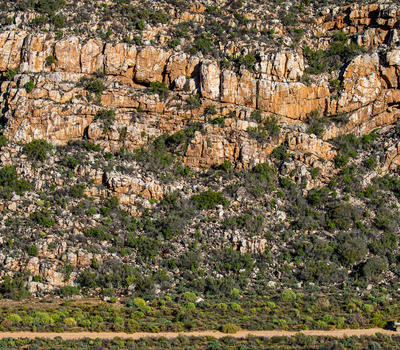
Nature Drives
Traverse the landscape of Sanbona Wildlife Reserve with a qualified ranger in comfortable open Landcruisers. During the drive, be it in the early morning or for sundowners, various species of plants, animals, big game and birds can be seen.
Sundowner evening drives offer spectacular displays of light as the evening sun sets over the Little Karoo.
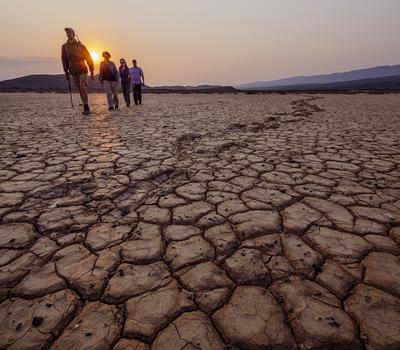
Guided Wilderness Walks
Discover the spirit of the Little Karoo on foot and see the many treasures on the Reserve.
An optional walk with the guidance of a ranger can be arranged to cater for individual needs. From gentle strolls, taking in the breath-taking beauty of the indigenous fauna and flora, to challenging trails discovering isolated vistas, reveal the beauty of Sanbona Wildlife Reserve.
Be it a gentle walk, or challenging trail to a secluded rock pool which invites one to submerge into its invigorating bliss and then returning to your lodge for a scrumptious meal, Sanbona Wildlife Reserve has all of this and much more to offer.
Relaxation Retreats
At our Relaxation Retreats, Mother Nature is brought indoors for indulgent pampering. Our body range draws on properties from the world famous indigenous “Fynbos” plant kingdom, eliminating toxins, soothing the soul and rejuvenating the body.
The Relaxation Retreats at Sanbona overlook ancient rock formations and undulating mountains and plains. While the rejuvenating forces of nature cradle you, we deliver a range of world-class treatments and holistic modalities to balance and energise your being. Step into the privacy of our tranquil retreats – let the gentle atmosphere envelop and embrace your body, mind and soul ...
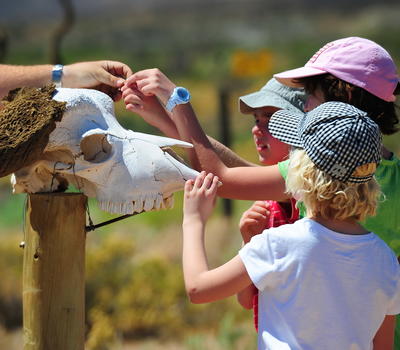
Eco-Explorers
Upon arrival at Sanbona, kids can expect to have the time of their life through our Eco-Explorers packages. With exciting activities planned, interactive welcome packs and even child minding services on request, mom and dad won’t have to worry about a thing.
Outdoor Activities for Children
While kids under 4 years old are not permitted on game drives, there are a host of exciting adventures that await your little ones and mom and dad too, such as:
Interpretive trail – This takes your kids through the garden of Gondwana, to learn about animals on the reserve as well as their tracks, important plants, and more.
Sanbona Activity Book – An educational, fun and interactive book, teaching children about the wildlife at Sanbona while also encouraging them to get involved with everyone as they often require the ranger’s assistance to answer some of the questions.
Indoor Activities for Children
Should the weather not be in our favour, it doesn’t matter because Gondwana Family Lodge is prepared to accommodate the unpredictable Western Cape climate through:
Arts and crafts
Puzzles of varying sizes and difficulties covering a broad age range
Documentary DVD’s on various conservation topics and animals as well as animated movies
Entertaining and educational children’s books
A selection of fun board games
Stargazing at Sanbona
With the absence of artificial light, the stargazing at Sanbona Wildlife Reserve is phenomenal and amongst the best in Southern Africa.
Interpretations about the constellations of the Southern Hemisphere are given by knowledgeable guides. Romantic stories of gods and goddesses banished to the heavens are woven into astronomical facts and unfolds before one’s eyes. Discover the ancient myths of the stories told by the San about their visions of the stars.
How better to end a blissful day at Sanbona but to sit reflecting under the star studded-canopy of African skies, the vastness of infinite galaxies stretching before one.
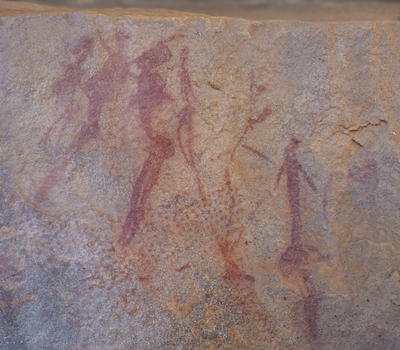
Rock Art at Sanbona
The San people of Africa roamed the area for thousands of years until 100 years ago.
The /Xam tribe, the nomadic hunter-gatherers living in harmony with nature realised then that man and nature together is sustainable.
There are 7 recorded sites throughout Sanbona Wildlife Reserve, however many more can be found. Rock art sites date back to more than 3500 years and depict the spiritual beliefs and lives of these fascinating people. During their travels, members of the group would congregate around a communal fire, weaving stories and celebrating the gift of life while the Shaman would meditate through rhythmic dancing, singing and clapping and while in a trance, receive visions and guidance. This medicine man or woman would ensure the well being of the tribe, protecting them from evil and sickness, predicting the future and ensuring good hunting and rains. Certain animals such as the Praying Mantis and the Eland were honoured and revered and were considered to have great spiritual powers.
The only evidence that remains of these little people is the delicate rock art found on Sanbona Wildlife Reserve, their indelible footprints left of their presence in this vast landscape for generations to come.
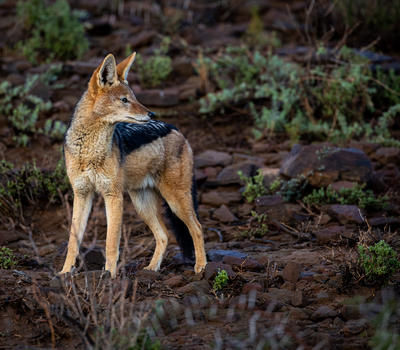
Fauna & Flora at Sanbona
Sanbona Wildlife Reserve has about 600 species of plants and it is intriguing to know that various species are flowering at different times throughout the year, although some more prolific between August and September.
Approximately half of the reserve used to be livestock and agricultural farms and all aspects of farming are systematically being removed. There are various floral kingdoms that make up the Reserve. These include Acacia Thickets, Nama, Karoo, Renosterveld, Succulent Karoo and Central Mountain Fynbos. Succulents are especially varied and fascinating with names like Baby’s Bottoms, Ostrich Toes and Pig’s Ears.
Animals that roamed the area freely living amongst the San but were eradicated are being reintroduced. The Big 5 – Lion, Leopard, Buffalo, Elephant and Rhinoceros as well as various other species such as Gemsbok, Springbok, Hartebeest, Eland, Kudu, Black Wildebeest and Zebra will be seen on Sanbona Wildlife Reserve. Natural small game such as Jackal, Caracal, Aardwolf, Ant bear, Brown Hyena, Grey Rhebuck, Steenbuck, Klipspringer, Grysbok and Common Duiker continue to thrive.











